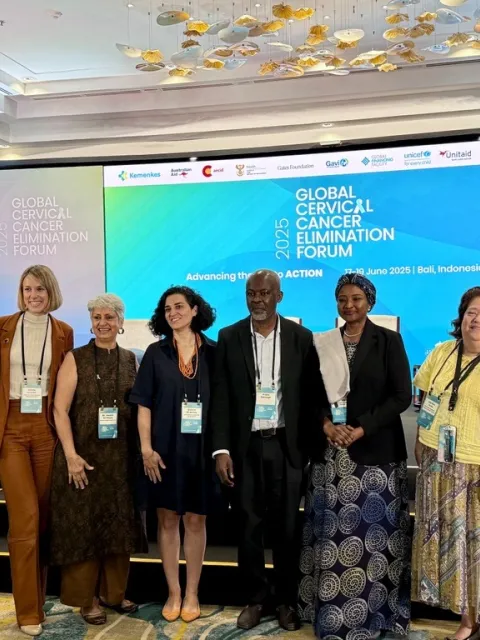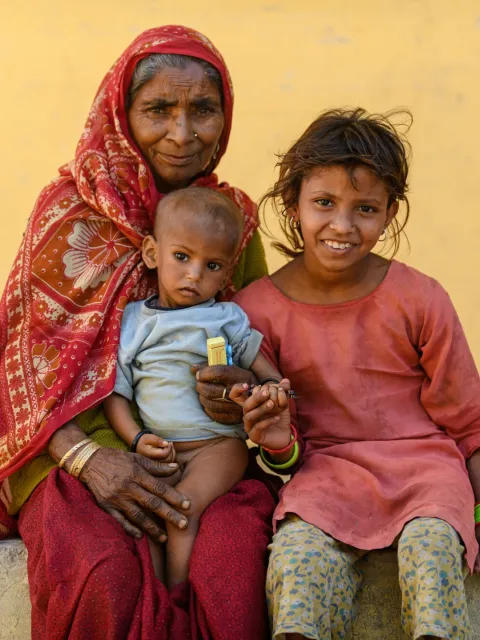Tackling cervical cancer in Burkina Faso: a comprehensive approach by COBUCAN
In an interview with UICC, Prof. Nayi Zongo offers an in-depth perspective on the challenges and advancements in oncology in Burkina Faso, particularly with respect to cervical cancer, against a backdrop of changing dietary habits and persistent infectious diseases.

HIGHLIGHTS
-
Cancer cases are on the rise in Burkina Faso, becoming the second leading cause of mortality after infectious diseases, primarily driven by population growth and shifting dietary habits.
-
Prof. Nayi Zongo, President of the Burkinabe Coalition Against Cancer (COBUCAN), underscores significant barriers to cancer care in the country, including fear of diagnosis, high treatment costs, limited health insurance, and late cancer detection, leading to reduced access to timely diagnosis and treatment.
-
COBUCAN's efforts, supported by UICC and the SUCCESS project, have facilitated public awareness, advocacy campaigns, and technological advances in cancer care, emphasising the importance of continued governmental support and financial commitment to national cancer control objectives.
Despite a decrease in deaths due to infectious diseases, they continue to dominate Burkina Faso’s health landscape. Cancer cases have been rising significantly, however, and cancer is now the second cause of mortality after infectious diseases and before cardiovascular disease.
This increase in the cancer burden is due in part to a rise in population, which has doubled since the turn of the millennium in Burkina Faso, but it is also driven by a transition to a more westernised diets that involves the consumption of uncontrolled, adulterated food products. "This highlights the connections between lifestyle changes and health, and the need for stringent food quality control measures," says Prof. Nayi Zongo, President of the Burkinabe Coalition Against Cancer (COBUCAN).
At the same time, significant barriers to care exist, which are fuelling higher mortality rates. These include fear of diagnosis, exorbitant treatment costs, the lack of health insurance and limited financial resources. This prevents an equitable access to chemotherapy or surgery, according to Prof. Zongo. Another significant challenge is the late detection of cancer, when it is harder to treat successfully.
"Previously, people were dying of cancers that were not even diagnosed. This situation is improving, we are now doing better at detecting cancer, but overall cancers are still being detected late as many patients are unable to access timely diagnosis and treatment. Financial constraints, too, play a significant role in limiting access to comprehensive cancer treatment, despite some treatments being subsidised for specific cancers, equitable access to treatments such as chemotherapy and surgery is not guaranteed."
– Prof. Nayi Zongo, President of the Burkinabe Coalition Against Cancer (COBUCAN)
Prof. Zongo’s journey in the field of oncology began with his deep interest in pathology and human anatomy as a student. This path led him through general surgery and onto a specialisation in surgical and medical oncology, including breast cancer studies, in Dakar and Paris. Returning to Burkina Faso in 2013, he quickly realised that clinical treatment alone was not sufficient to combat cancer effectively and there was a need for greater public engagement in cancer awareness.
This understanding drove him to establish the Ligue burkinabè contre le cancer du sein (Burkina Faso League Against Breast Cancer) in 2016, focusing on breast cancer awareness and reaching millions of women.
This was followed in 2020 with the creation of a coalition of organisations working on cancer awareness (‘Coalition burkinabè contre le cancer’, or COBUCAN), offering a unified vision in the fight against cancer in the country. "We decided to federate the various associations to have common objectives and a stronger advocacy voice," says Prof. Zongo. This action was supported by UICC, as part of the Unitaid-funded ‘Scale-Up Cervical Cancer Elimination with Secondary prevention Strategy’ (SUCCESS) project, led by Expertise France, and implemented in partnership with Jhpiego.
Further supported by the SUCCESS project, COBUCAN was able to map the country’s network of cancer associations and conduct early public awareness as well as advocacy campaigns.
“We were particularly focused on sensitising public opinion to the importance of prevention and screening, and destigmatising cervical cancer. We organised workshops to inform journalists and social media influencers, and leveraged traditional leaders to spread the message. Our advocacy with public authorities and work with Ministry of Health allowed us to obtain free radiotherapy for cervical cancer, making treatment accessible to all women. Finally, a HPV vaccination programme was introduced in 2022.”
– Prof. Nayi Zongo, President of the Burkinabe Coalition Against Cancer (COBUCAN)
Prof. Zongo further highlighted technological advances, such as the use of self-sampling kits for cancer screening and the introduction of thermocoagulation technology, which is more portable and suitable for remote areas compared to cryotherapy. He believes that these innovations, aligned with the WHO recommendations for the screening and early detection of cervical cancer, can make a significant difference in cancer care accessibility.
Looking to the future, Prof. Zongo stressed the importance of continued governmental support and financial commitment to national cancer control objectives: "There continue be challenges in vaccination campaigns, for instance, such as concerns of parents about the vaccine’s impact on fertility and misconceptions about HPV transmission. We’re in ongoing negotiations for broader implementation of HPV testing and need budget allocation to support our national cancer control directives."
Prof. Zongo’s recent appointment as Coordinator of the National Cancer Programme at the Ministry of Health reflects the impact and importance of his work and underscores his credibility and that of COBUCAN. His experience emphasises the importance of a multifaceted approach to cancer control. It also, however, underscores the urgent need for resource allocation, the implementation of technological advancements and comprehensive public health strategies.
Last update
Friday 26 January 2024
